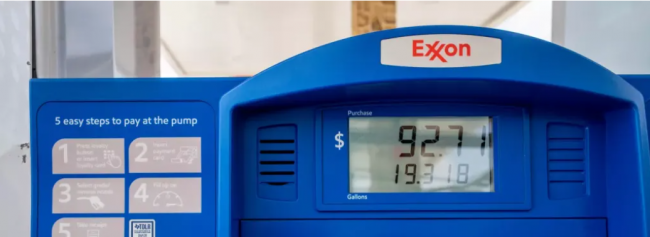Articles Menu

Aug. 1, 2022
As fossil fuel giants this week reported record profits for the second quarter, an analysis out Friday highlighted how eight oil companies have raked in nearly $52 billion over the past three months “while Americans continue to struggle at the pump.”
The review by the watchdog group Accountable.US revealed that from April through June, Chevron, Equinor, ExxonMobil, Hess Corp, Phillips 66, Shell, and TechnipFMC “saw their profits skyrocket from the same time period last year, with income shooting up 235%.”
The analysis also pointed out that leaders at Equinor, Halliburton, Hess Corp, and TechnipFMC have boasted “about excellent quarters while dismissing high prices for consumers.”
Jordan Schreiber of Accountable.US called the companies’ collective profit boost “eye-popping” but also unsurprising “after spending the past three months price gouging consumers by raising gas prices to unprecedentedly high levels.”
“Make no mistake; these profits mark a large transfer of wealth from working- and middle-class people to wealthy oil executives and shareholders,” she said. “While many consumers were feeling the heavy burden of a life necessity suddenly doubling in price, oil executives were keeping prices high to maximize their profits.”
The Q2 profits of U.S. energy giants Chevron and Exxon—$11.62 billion and $17.85 billion, respectively—along with that of Europe’s largest oil company, Shell—$11.47 billion—drew widespread criticism along with calls for action by lawmakers and President Joe Biden.
“Big Oil companies are making a killing and pouring fuel on the climate fire while communities pay for more and deadlier climate disasters. It’s outrageous,” said Richard Wiles, president of the Center for Climate Integrity, in a statement Friday.
“Exxon and other oil and gas corporations lobbied and lied for decades to keep the world addicted to fossil fuels, making billions while hardworking families pay for higher gas prices and costlier heatwaves, wildfires, droughts, and floods,” he continued. “Now Exxon is once again using its record profits to line the pockets of executives and shareholders.”
Wiles asserted that “elected officials cannot remain silent in the face of this injustice. Whether it’s taxing these companies’ record profits, or taking them to court to make polluters pay for climate damages they knowingly caused, it’s time to stand up to Big Oil.”
Public Citizen president Robert Weissman declared that “Big Oil is laughing all the way to the bank—and the joke’s on us.”
“We don’t have to be suckers,” he argued. “A windfall profits tax with rebates to taxpayers would offset the pain at the pump and end Big Oil’s profiteering. Banning U.S. oil exports would actually lower prices for American consumers.”
According to Weissman, “It’s time for Congress and the Biden administration to stop complaining about Big Oil’s rip-off and start doing something about it.”
Some lawmakers agree. While Republicans “will continue to play politics and blame Biden for gas prices,” Rep. Mark Pocan (D-Wis.) said of the fossil fuel giants’ quarterly profits, “we need to crack down on Big Oil.”
Sen. Bernie Sanders concurred, tweeting that “it’s time for a windfall profits tax.”
While some of his colleagues have introduced legislation focused on Big Oil, Sanders has put forth a broader tax proposal that would target price gouging by a range of companies.
Amid rising fears of recession in recent weeks, calls have been mounting for federal lawmakers to more forcefully take on corporate greed. The Inflation Reduction Act unveiled Wednesday features some related policies, but climate activists have also sounded the alarm about its energy provisions. The bill—negotiated with fossil fuel ally Sen. Joe Manchin (D-W.Va.)—contains major handouts that are reportedly “delighting” the oil and gas industry.
The fossil fuel industry has not only used its record profits to enrich shareholders; it’s also dumped money into influencing officials on Capitol Hill. As Common Dreams reported exclusively on Thursday, an analysis from Climate Power shows that since last year, the sector has poured over $200 million into sabotaging climate action.